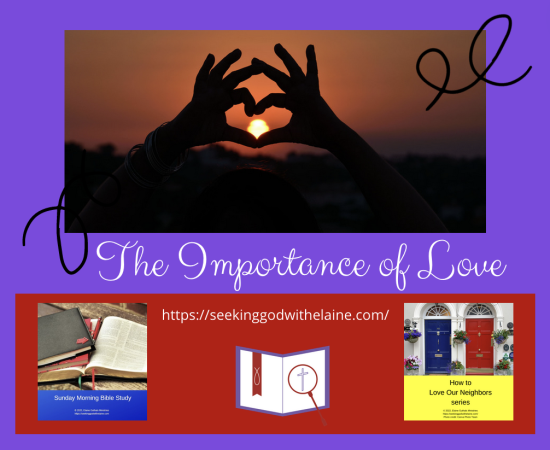Love is more than just a feeling. This daily devotional looks at the importance of love in contrast to our spiritual gifts and spiritual graces.
Nuggets
- Our spiritual gifts mean nothing if we do not serve through love.
- We don’t have faith if we don’t have love.
- Trials teach us nothing if we do not navigate them through love for God.
Devotions in How to Love Our Neighbors series

When we hear First Corinthians 13, we immediately think of romance and weddings. That wasn’t on Paul’s mind.
What?!? The love chapter isn’t talking about our soul mate?!?!?! ?!?
No. If we look at Chapter 12 and Chapter 14, we see Paul was writing about spiritual gifts.
Now, I know Paul chased a lot of rabbits, but I don’t think he would have squirreled on something as important as this.
We only gain perfection — spiritual maturity — through love. Our spiritual gifts not only give us God’s character, but they also show that we are maturing.
So, let’s switch our focus and look at love through the lens of being perfected.
Let's Put It into Context #1
Here is a running list of nuggets for the series.
Let's Put It into Context #2
Perfection means we reach a state of maturity because the combination of the spiritual graces form, when all are present, spiritual wholeness or completeness — holy, sanctified, and righteous.
- Spiritual graces are worldly morals that have been submitted to God to further His kingdom instead of enhancing this world.
- Holy means to be set apart — because of our devotion to God — to become perfect, and morally pure while possessing all virtues.
- Pure means not being sinful or having the stain of sin.
- Holy means to be set apart — because of our devotion to God — to become perfect, and morally pure while possessing all virtues.
- Sanctified means to be set free from sin.
- Sin is not believing that Jesus is our Savior to save us from our actions by humans that disobey God and break one of His reasonable, holy, and righteous laws and commandments, goes against a purpose He has for us, or follows Satan’s promptings.
- Righteous means we are free from sin because we are following God’s moral laws.
- Virtues are standards of moral excellence.
Glossary
Communicating through Love
“If I speak in the tongues of men and of angels, but have not love, I am a noisy gong or a clanging cymbal” (I Cor. 13: 1 ESV)
Our spiritual gifts mean nothing if we do not serve through love.
When we were talking about spiritual gifts, we really didn’t talk about what speaking in tongues was. Let’s dig in now.
When I have thought about tongues, I thought it was a heavenly language. It does say here “If I speak in the tongues … of angels, but have not love …” (I Cor. 13: 1 ESV).
We don’t know how we are going to communicate in Heaven. We know we will. “And I heard every creature in heaven and on earth and under the earth and in the sea, and all that is in them, saying, ‘To him who sits on the throne and to the Lamb be blessing and honor and glory and might forever and ever!’” (Rev. 5: 13 ESV).
We tend to think this is a spiritual gift that is high up in the hierarchy of spiritual gifts. We think of this as God’s language.
But that isn’t all it is talking about here. It is also talking about If I speak in the tongues of men … but have not love …” (I Cor. 13: 1 ESV).
So, what is important here?
- The ability to communicate.
- The ability to build a relationship.
- The opportunity to witness.
The foundation of this communication has to be grace. Garbett pointed that out in his sermon. He wrote, “The very words themselves have something about them of the grace which they describe.”
Grace is a free and unmerited gift of love from the Heavenly Father, given through His Son, Jesus Christ, that enables salvation and spiritual healing to believers by the work of the Holy Spirit.
Resource
Glossary
Grace is the foundation of communication, but it comes out of love. If you think about it, love does have three components: humility, gratitude, and generosity.
- Love is not about being prideful. It focuses on the recipient rather than ourselves.
- Love is not about feeling entitled. We do not expect it but are thankful for it.
- Love is not about being stingy. Love is about what we give, not receive.
True love comes from God. It is more than just our disposition and acts.
It is a fruit of the Spirit. That makes it not only God’s character but also a reward for our obedience.
Think of it this way. We are to witness to others to tell them of the gospel. We are to help them understand God’s love for them and their need for salvation. We can’t do that if we don’t communicate through love.
Loving through Faith
“And if I have prophetic powers, and understand all mysteries and all knowledge, and if I have all faith, so as to remove mountains, but have not love, I am nothing” (I Cor. 13: 2 ESV)
We don’t have faith if we don’t have love.
Paul went on talking about things that didn’t matter if they were not accompanied by love. What he mentioned was something that we should want to have a lot of — faith.
Coolidge argued that love is superior to the spiritual gifts. He felt that way because these are not moral gifts.
Resource
I don’t know. In a way, I can see it.
So, we can see the future and have all sorts of knowledge. They have no value without love.
I see love as the foundation of faith, too. If we don’t love God, faith has no value.
But does that make love superior to prophecy and faith?
Love is the single element of the greatest commandments. But if we don’t have faith in God, our love is meaningless. “You believe that there is one God. Good! Even the demons believe that—and shudder” (Jas. 2: 19 NIV).
I would be more comfortable saying love is the reason for faith rather than it being superior to the other gifts.
Still, either way we look at it, one is worthless without the other.
I think Blackburn explained it better than Coolidge. He said that spiritual graces are more valuable than gifts. Spiritual graces are worldly morals that have been submitted to God and elevated to His character in order to further His kingdom instead of enhancing this world.
Resource
Spiritual graces deal more with our character than our gifts do. Gifts are our skills and abilities. Graces are who we are.
Charity through Love
“If I give away all I have, and if I deliver up my body to be burned, but have not love, I gain nothing” (I Cor. 13: 3 ESV)
Trials teach us nothing if we do not navigate them through love for God.
The King James Version translates the word as charity. All other versions translate it as love.
In verse 3, Paul talked about what we would call charity. We are providing for others in their need. To do this, we give away something we possess.
Alford didn’t see Paul talking about a body being burned as roasting it on a bon fire. He saw it as all the toil and sacrifice we do being useless.
Resource
Yes, we’ve said many times that we grow through the trials we face. The trials can’t be the only element.
Edwards explained this. He wrote, “It is not the work or the suffering that is, in itself, worth anything in the sight of God.” The Scripture he used was “… For the Lord sees not as man sees: man looks on the outward appearance, but the Lord looks on the heart” (I Sam. 16: 7 ESV).
Resource
We’ve got to get the lesson we are to learn to the heart level. We do that by using the trial to deepen our love for God.

Making the Connections
Let’s look at all three verses together.
“If I speak in the tongues of men and of angels, but have not love, I am a noisy gong or a clanging cymbal. And if I have prophetic powers, and understand all mysteries and all knowledge, and if I have all faith, so as to remove mountains, but have not love, I am nothing. If I give away all I have, and if I deliver up my body to be burned, but have not love, I gain nothing” (I Cor. 13: 1-3 ESV).
What was Paul talking about here? One thing is communicating with others, especially what God was going to do in the future, so they could believe.
But it is also talking about our relationship with God. Sacrifice alone isn’t going to cut it. We have to have genuine faith in Christ.
It all comes down to motivation. It isn’t going to cut it if we do the right thing for the wrong reason.
Does that mean God isn’t going to use our service if we are doing it wrong? Not necessarily.
What won’t happen is we get a reward for doing it — or as great a reward.
God wants things done His way in His time for His glory.
How Do We Apply This?
- Ensure our views match those of Jesus.
- Look at situations through the lens of God’s love.
- Never underestimate the power of the cross, because Jesus’ death on it was an act of love.
- Pray that the Holy Spirit creates love within us.
- Mortify our prayers temper, pride, and selfishness.
- Show others love by meeting their needs.
- Put love in its place and realize we shouldn’t be praised for it or blamed for the lack of it.
- Possess a generous moral sympathy for all.
- Reveal love to others to show Christ to them.
- Examine our hearts for love.
- Witness to others.
- Seek love through diligent prayer.
Resource
Father God. We thank You that our love for You is the basis for all we do. Only with Your love in us can we have the foundation we need to love others. Help us to communicate to them their need for Jesus as their Savior and Redeemer. Amen.
What do you think?
Leave me a comment below (about this or anything else) or head over to my Facebook group for some interactive discussion.
If you don’t understand something and would like further clarification, please contact me.
If you have not signed up for the email daily or weekly providing the link to the devotions and the newsletter, do so below.
If God has used this devotion to speak with you, consider sharing it on social media.